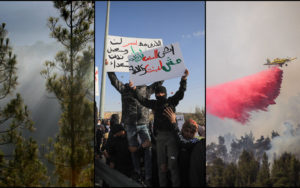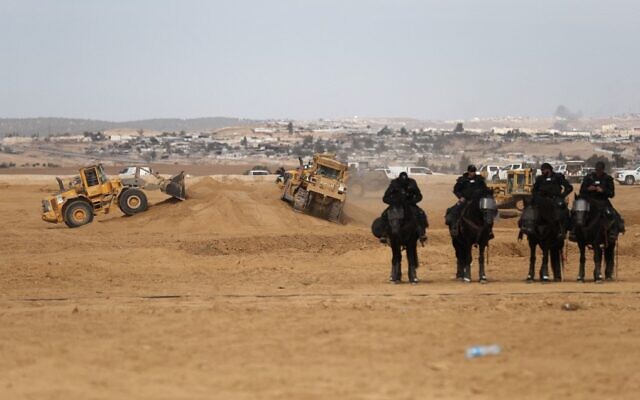Aleppo pine widely used in JNF’s forestation project is described by some as being ‘like a gallon of petrol’; Bedouins see tree plantings as disrupting their farming livelihoods

(L-R) Pine trees in a forest near Jerusalem; Bedouins protest against tree planting by the Jewish National Fund, outside the village of al-Atrash in the Negev desert, on January 13, 2022; Firefighting planes extinguish a forest fire near Jerusalem, on June 9, 2021.
Cnaan Liphshiz writes in Times of Israel 17 January 2022
Each year on Tu Bishvat, the Jewish holiday celebrating trees and plants, Lior Weitz and his wife take their two daughters to plant saplings of pine — the tree that more than any other symbolizes Israel’s historic forestation project.
They join thousands of families at one of the annual planting ceremonies organized by the Jewish National Fund, a Zionist organization established in 1901 and the Jewish state’s main forest management agent. It has planted about 240 million trees, many of them pines, on some 227,000 acres, a land area larger than New York City.
“It’s an activity that combines everything we believe in: The love of the environment, land, country, and growth,” said Weitz, 46, a website manager from Ramat Gan.Diaspora Jews, meanwhile, have long grown up donating money for JNF trees, a tangible symbol of their emotional and financial investment in Israel.
But increasingly, the JNF’s signature program has drawn vocal critics. Those with ideological objections call it colonialist, and environmentalists call it harmful because it has allowed a single species to spread unchecked, diminishing biodiversity and increasing the risk of forest fires.
The colonialism claims have resurfaced periodically in international media as part of their coverage of the Israeli-Palestinian conflict, linking forestation to the “Judaization” of previously Arab-owned land. Advocates of JNF say its forests are planted on land legally purchased by Zionists for the establishment of a Jewish state. A JNF spokesperson told the Jewish Telegraphic Agency that the tree planting began as an effort to “demonstrate ownership” over non-urban Jewish-owned land that could not be farmed.

Mounted police stand guard during a protest by Bedouins in the southern village of Sawe al-Atrash in the Negev Desert against a forestation project, on January 12, 2022. (Ahmad Gharabli/AFP)
The most recent example of this wider controversy is unfolding in the Negev desert, where Bedouins have protested that the trees are disrupting their farming livelihoods. Dozens have been arrested in police clashes, and an Arab-Israeli party put the Israeli government’s razor-thin coalition majority in jeopardy by threatening to pull out of the coalition until the forestation stopped. As of Wednesday night, JNF building had stopped in the area.
But the conflict does not appear to have diminished Israelis’ enthusiasm for the practice. About 30% of the 300,000 trees that JNF plants annually are placed in the ground by volunteers, according to Hagay Yavlovich, one of the JNF’s senior-most foresters.
More …


